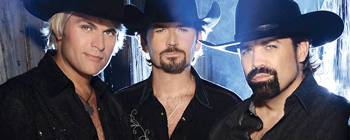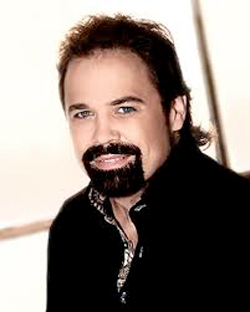by Mike Telin

On Sunday, October 22 at 7:30 pm at Stambaugh Auditorium in Youngstown, The Texas Tenors — opera singer John Hagen, country music singer JC Fisher, and pop singer Marcus Collins — will present a concert of country, classical, Broadway and pop selections. Tickets are available online.
Since their debut eight years ago on NBC’s America’s Got Talent, the Trio has amassed a list of awards including three Emmys for the PBS special You Should Dream. They have performed more than 1,000 concerts around the world and collaborated with many Symphony orchestras including the Cleveland Pops, the Houston Symphony and the Pittsburgh Symphony. In 2018, The Tenors will make their Canadian debut at Toronto’s Royal Conservatory of Music.
Sunday’s concert will feature many of the songs from their latest recording, RISE, released on September 8 of this year, and the Trio’s second PBS special, The Texas Tenors: RISE, that began airing nationwide in August. Click here for broadcast information.
“There will be a little bit of everything,” Hagen said. “A mixture of original tunes as well as some great covers of the Eagles’ Desperado, Bruno Mars’ Just the Way You Are, and The Righteous Brothers’ You’ve Lost That Lovin’ Feelin. And of course, a Classical piece, along with few songs that are not on the album.” Although on the recording The Tenors are backed up by a 65-piece orchestra and full choir, the Stambaugh show will be more intimate. “Like the majority of our concerts, it will just be us and our band, but we do around twenty symphony orchestra concerts a year.”
Hagen, who made his Lincoln Center debut in Teatro Grattacielo’s production of Mascagni’s Gulglielmo Ratcliff, has performed operatic roles from Alfredo in La traviata to the title role of Otello for Cleveland Opera on tour. His Broadway roles include Billy Bigelow in Carousel and Che in Evita. He explained that the Trio’s first PBS special, which aired in 2013, came about through a professional relationship they had with the Phoenix Symphony. “Some people from KAET asked us if we had ever thought about doing a Public Television special. Long story short, we collaborated with the Symphony and it was very well received. And when PBS asked us to do another one, we thought, why not?”

Although JC Fisher and Marcus Collins met nearly twenty years ago when they were cast as production singers for Celebrity Cruise Lines, Hagen met Fisher when they were working a construction job. “You can believe that or not, but we were doing the starving artist thing,” he said. “JC had the idea of putting together three tenors of different voice types and trying to cover different genres of music, and this is what we came up with. As they say, the rest is history.”
When The Tenors decided to take the audition for America’s Got Talent, he admitted to being a little skeptical about the idea. “My first thought was, I don’t know, because the night I watched it I saw some pretty strange stuff. But it did end up being a great thing for us. The exposure and publicity you get from being on National TV for twelve weeks is priceless. At that time, it was aired in over sixty countries. We work very hard but we do feel fortunate because without that exposure, who knows where we would be. But it wouldn’t be where we are, that’s for sure.”
Born in Waverly, Iowa, Hagen is the son of two music teachers — his father was a high school choral director. “Dad formed a jazz choir because he felt it would train the ears of the young singers with all of the tight harmonies. I grew up being exposed to a lot of classical music and jazz as well. The one thing I didn’t grow up listening to was country music. Not that I didn’t like it, I just wasn’t exposed to it.”
Being that Hagen’s father was a tenor, there were plenty of recordings of the world’s greatest tenors in the house “I got hooked on Pavarotti as a young teen and I always did appreciate opera,” Hagen said. “I heard some great opera singers at a young age. I met Robert Merrill when I was twelve. Years later I ran into him in New York when I was in my 30s and I told him I remembered meeting him. He pinched my cheeks and said ‘Thank you, my boy.’ I had never forgotten his voice and the influence it had on me. It was like a giant cannon coming out of his body.”
When it came time for Hagen to enter college, he set his sights on music education. “I wasn’t thinking about singing as a career, but rather doing something like my father — building a good choral program somewhere, whether it be in a high school or college. It wasn’t until later that I became interested in performing, but as I got cast in a few things simply because I could sing, I thought, Oh, I kind of like this.”
It was during graduate school that he became truly interested in singing. “I became an audiophile of the great tenors and would listen to the same aria by ten tenors. I loved analyzing the differences in the recordings, the way each singer would interpret a piece, and their different techniques. That’s how nerdy I was.”
Wrapping up our conversation, I ask Hagen how The Texas Tenors have evolved as an ensemble since their breakthrough on America’s Got Talent. “We’ve learned how to cross musical boundaries better,” he said. “And musically speaking, we’ve grown significantly, which would make sense after over a 1,000 performances. I always laugh when somebody says that we just keep getting better and better — I’m glad that it’s not the other way around.”
Published on ClevelandClassical.com October 17, 2017.
Click here for a printable copy of this article



